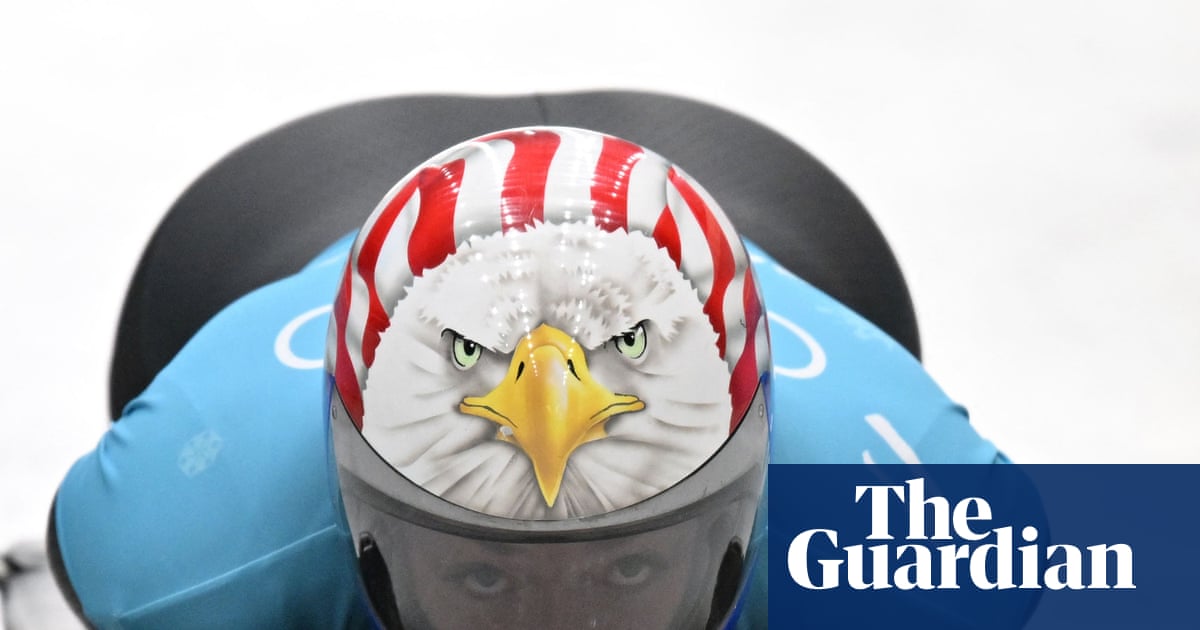Dressed in a khaki jumpsuit, his face red in a way that suggests recent tears, Owen Hanson describes his life behind bars. On his first day in prison, another inmate gave him a weapon – a “bonecrusher” – and told him to keep it on him at all times. “I’m some fucking surfer kid from Redondo Beach and you’re telling me I have to go to war?!” Hanson says, shakily.
This is one of many moments in the first episode of Cocaine Quarterback that makes me deeply sceptical. The three-part docuseries – released under the Prime Video Sports umbrella – tells the story of a college footballer from California turned drug kingpin, but part one feels more like The Owen Hanson Story, as presented by Owen Hanson. Central to the tale is his father’s alcoholism, his parents’ divorce, and his first, faltering forays into pill-smuggling, when he rolled up a bag of steroids in Tijuana and stuffed it down the back of his underwear (“not inside the hole,” he elucidates, “[but] in the crack”). The steroids were for his own use. But soon he would be hawking them to his fellow footballers at the University of Southern California, a place conjured up here via exuberant archive footage of players flinging themselves through the air and marching bands. Before long, Hanson was dealing harder drugs – and working with one of the world’s most dangerous organised crime groups, Mexico’s Sinaloa Cartel. He had, says Alex Cody Foster – the co-author of his memoir – “the hustle mindset”. More than once it is said that he could have been the CEO of a Fortune 500 company had he put his mind to it.

Gladly, Cocaine Quarterback turns out to be more than just an elegy to Hanson’s business acumen. It shares much of its tonal DNA with McMillions, the wry documentary about the McDonald’s Monopoly fraud, also produced by Mark Wahlberg’s Unrealistic Ideas (director Jody McVeigh-Schultz was an editor on that series). As McMillions leaned on larger-than-life characters to tell its tale, so too does Cocaine Quarterback, and the result often feels more mockumentary than documentary. The visuals, too, are frequently droll: reconstructions show dishwashers loaded with cash rather than plates, and phone screens feature pithy messages from the cartel to Hanson. When he gets himself into a pickle in Australia and attempts to send gold bullion back to the US inside furry boots, a text pops up from his bosses: “No more Uggs, mijo.” Elsewhere, MTV Cribs-style images flash up when we learn about the time Hanson gutted his family home (it was, he says, “a dump”), transforming it into a greige mansion complete with $2,000 bottles of tequila on every surface.
The main narrative driver here is Hanson’s enduring beef with a professional gambler named Robin Hood 702, who loses the money Hanson says he was supposed to be laundering for him on behalf of the cartel. Robin Hood, AKA Robert Cipriani, denies that this was ever the deal. In any case, he did take $2.5m to a casino, and left with nothing – inadvertently tipping off police and kickstarting a feud with Hanson, who describes him, charmingly, as a “cockroach”, a “maggot” and a “degenerate”. To say that Cipriani comes across as smug and flippant would be an understatement, but Hanson knew how to rile him up. Cue an eccentric private investigator who not only desecrated Cipriani’s mother’s grave, but also Photoshopped a mask-wearing, shovel-holding Hanson into a picture of said grave for extra menace.
If Hanson is initially imbued with far too much glamour, the scuzzier reality of his life of crime slowly unfurls over the three episodes. As Nick Mullaly of the New South Wales police says, Hanson was “very ruthless”. Kate McClymont from the Sydney Morning Herald prefers the term “stupid idiot” when it comes to him and his money-laundering associates, who are found to have been brazenly discussing their illegal activities on the phone, not knowing that law enforcement were listening in. After lying in a police interview, Andrew McManus – a music promoter who brought the likes of Lenny Kravitz and Fleetwood Mac to Australia – declared himself “a fucking Academy Award winner!”
The end result is a series that’s more entertaining than it has any right to be, and one that lurches firmly back into cautionary tale territory as we learn more about how Hanson was eventually caught (he was sentenced to 21 years in prison in 2017). Really, the whole thing has a lot less to do with sport than it initially claims to; while many of Hanson’s friends ended up in the NFL, he was nowhere near going pro. But as an entry point to a zany true crime tale, it really is a touchdown.

 3 months ago
67
3 months ago
67

















































